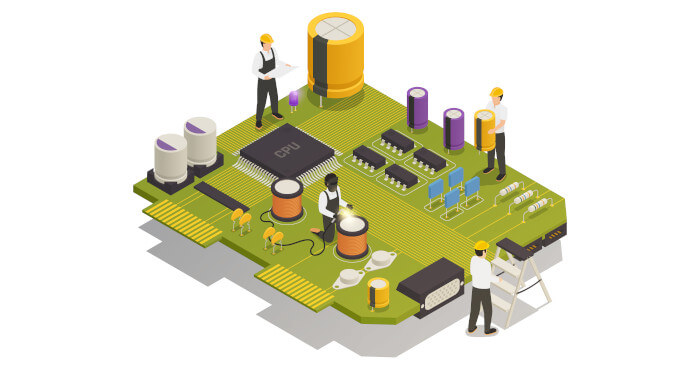PyOPUS is a library for simulation-based optimization of arbitrary systems. It was developed with circuit optimization in mind. The library is the basis
for the PyOPUS GUI that makes it possible to setup design automation tasks with ease. In the GUI you can also view the the results and plot the waveforms generated by the simulator.
PyOPUS provides several optimization algorithms (Coordinate Search, Hooke-Jeeves, Nelder-Mead Simplex, Successive Approximation Simplex, PSADE (global), MADS, …). Optimization algorithms can be fitted with plugins that are triggered at every function evaluation and have full access to the internals of the optimization algorithm.
PyOPUS has a large library of optimization test functions that can be used for optimization algorithm development. The functions include benchmark sets by Moré-Garbow-Hillstrom, Lukšan-Vlček (nonsmooth problems), Karmitsa (nonsmooth problems), Moré-Wild, global optimization problems by Yao, Hedar, and Yang, problems used in the developement of MADS algorithms, and an interface to thousands of problems in the CUTEr/CUTEst collection. Benchmark results can be converted to data profiles that visualize the relative performance of optimization algorithms.
The “pyopus.simulator“ module currently supports SPICE OPUS, HSPICE, and SPECTRE (supports OP, DC, AC, TRAN, and NOISE analyses, as well as, collecting device properties like Vdsat). The interface is simple can be easily extended to support any simulator.
PyOPUS provides an extensible library of postprocessing functions which enable you to easily extract performance measures like gain, bandwidth, rise time, slew-rate, etc. from simulation results. The collected performance measures can be further post-processed to obtain a user-defined cost function which can be used for guiding the optimization algorithms toward better circuits.
Website: fides.fe.uni-lj.si/pyopus
Support:
Developer: Arpad Buermen
License: GNU General Public License v3.0

PyOPUS is written in C and Python. Learn C with our recommended free books and free tutorials. Learn Python with our recommended free books and free tutorials.
Return to Electronic Design Automation
| Popular series | |
|---|---|
| The largest compilation of the best free and open source software in the universe. Each article is supplied with a legendary ratings chart helping you to make informed decisions. | |
| Hundreds of in-depth reviews offering our unbiased and expert opinion on software. We offer helpful and impartial information. | |
| The Big List of Active Linux Distros is a large compilation of actively developed Linux distributions. | |
| Replace proprietary software with open source alternatives: Google, Microsoft, Apple, Adobe, IBM, Autodesk, Oracle, Atlassian, Corel, Cisco, Intuit, SAS, Progress, Salesforce, and Citrix | |
| Awesome Free Linux Games Tools showcases a series of tools that making gaming on Linux a more pleasurable experience. This is a new series. | |
| Machine Learning explores practical applications of machine learning and deep learning from a Linux perspective. We've written reviews of more than 40 self-hosted apps. All are free and open source. | |
| New to Linux? Read our Linux for Starters series. We start right at the basics and teach you everything you need to know to get started with Linux. | |
| Alternatives to popular CLI tools showcases essential tools that are modern replacements for core Linux utilities. | |
| Essential Linux system tools focuses on small, indispensable utilities, useful for system administrators as well as regular users. | |
| Linux utilities to maximise your productivity. Small, indispensable tools, useful for anyone running a Linux machine. | |
| Surveys popular streaming services from a Linux perspective: Amazon Music Unlimited, Myuzi, Spotify, Deezer, Tidal. | |
| Saving Money with Linux looks at how you can reduce your energy bills running Linux. | |
| Home computers became commonplace in the 1980s. Emulate home computers including the Commodore 64, Amiga, Atari ST, ZX81, Amstrad CPC, and ZX Spectrum. | |
| Now and Then examines how promising open source software fared over the years. It can be a bumpy ride. | |
| Linux at Home looks at a range of home activities where Linux can play its part, making the most of our time at home, keeping active and engaged. | |
| Linux Candy reveals the lighter side of Linux. Have some fun and escape from the daily drudgery. | |
| Getting Started with Docker helps you master Docker, a set of platform as a service products that delivers software in packages called containers. | |
| Best Free Android Apps. We showcase free Android apps that are definitely worth downloading. There's a strict eligibility criteria for inclusion in this series. | |
| These best free books accelerate your learning of every programming language. Learn a new language today! | |
| These free tutorials offer the perfect tonic to our free programming books series. | |
| Linux Around The World showcases usergroups that are relevant to Linux enthusiasts. Great ways to meet up with fellow enthusiasts. | |
| Stars and Stripes is an occasional series looking at the impact of Linux in the USA. | |
